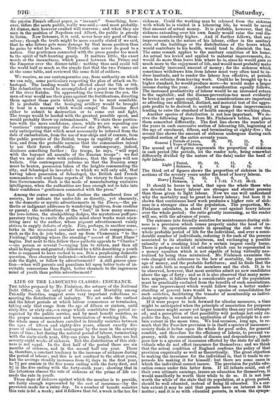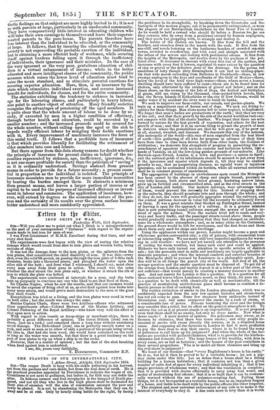LIFE OF THE LABOURING CLASSES: INSURANCE. THE tables prepared by
Mr. Finlaison, the actuary of the National Debt Office, on the subject of Sickness and Mortality among Friendly Societies, suggest some very important reflections re- specting the distribution of industry. We set aside the earliest and the latest periods at which labour commences or terminates, taking only that range from the age of fifteen or sixteen, until sixty-five or sixty-six,—a range which constitutes the period re- cognized by the public service, and by most benefit societies, as the proper commencement and termination of working life. On the whole mass of members enrolled in friendly societies between the 'ages of fifteen and eighty-five years, almost exactly five years of sickness had been undergone by the man in the seventy years of time ; but during the natural period of labour, terminating with the sixty-sixth year, fifty-one years in length, there are but seventy-eight weeks of sickness. But the distribution of this sick- ness is not equal. In the first half of the period there are six months of sickness, and in the second half one year. There is, therefore, a constant tendency to the increase of sickness during the period of labour; and this is not confined to the oldest years, but the average steadily increases from 61 days in the first year, to 7f per annum in the five years ending with the forty-first, and 81 in the five ending with the forty-sixth year; showing that in the laborious classes the rate of sickness at the prime of life ex- ceeds the rate in youth. Those days of sickness against which the member is to provide, are fairly enough represented by the cost of insurance—by the provision made for a rainy day. In a number of benefit societies this rate is 6d. a week; and it follows that 6d. a week is the tax for
{ sPiecriimode,ss, 1. 24,
11, 6, Light
1. 4.
The third set of figures shows the proportion of sickness in the sections of the seventy years under the head of heavy labour.
25, 12, 6, 3, Heavy t Psieerge'ss, 1. 1 7-12. 17-12. 1042.
It should be borne in mind, that upon the whole those who are devoted to heavy labour are stronger and stouter persons than those given to light labour. Now we can well understand why the mortality may be great in heavy labour ; but here it is shown that continuous bard work produces a higher rate of sick- ness in a stronger class of the population. The proportion, Mr. Finlaison calculates is about 82 per cent against heavy labour over the whole period; the ratio greatly increasing, as the reader will see, with the advance of years. The entrance into friendly societies for maintenance during sick- ness is a provision which comes properly under the head of in- surance: its operation consists in spreading the risk over the whole probable period of life for the individual, and over a consi- derable number of individuals, reducing it for each of the persons associated to its absolute minimum, and exchanging a possible calamity of a crushing kind for a certain impost easily borne. There is perhaps no kind of calamity which can be represented in a money equation which is not capable of being virtually neu- tralized by being thus minimized. Mr. Finlaison examines the rate charged with reference to the law of mortality, the percent- age of money, and the probable forfeitures; and he finds that the rate is safe both as respeote the members and the club. It is to be observed, however, that most societies admit no new candidates above the age of forty ; and as it is also observed that many mem- bers migrate, it follows that a considerable part of the population must be practically excluded from the benefits of such associations. The one improvement which would follow from a better under- standing of general laws would be a species of consolidation for such societies, facilitating the transfer of membership as indivi- duals migrate in search of labour.
If it were proper to look forward for ulterior measures, a time might be anticipated when the principle of association for purposes of insurance might secure yet larger benefits than any yet attempt- ed; and a perception of that possibility will perhaps not only ex- pedite the day, but secure an application of the principle to a cer- tain extent in the mean time. We had occasion, long ago, to re- mark that the Poor-law provision is in itself a species of insurance : society finds it better upon the whole for good order, for general comfort, and therefore for the efficiency of labour, to prevent va- grancy, with its concomitants of disease and despondency ; hence poor-law is a species of insurance effected by the state for all indi- viduals who do not effect insurance for themselves ; and we think that the actual condition of England confirms the policy of that provision empirically as well as theoretically. The great objection to making the insurance for the individual is, that it tends to su- persede his making it for himself: but there are some cases in which the individual cannot insure. The provision for public edu- cation comes under this latter form. If all infants could, out of their own ultimate earnings, insure an education for themselves, it would manifestly be worth their while to do so. It is not less worth the while of the state that its population, at a given periods should be well educated, instead of being ill educated. To a cer- tain extent it may be said that parents have an interest in this matter; and it is so with educated parents, in whom the sympa-
sickness. Could the working man be released from the sickness with which he is visited in a labouring life, he would be saved that amount of actual money. It is probable, however, that the sickness extending over his own family would raise the real dis- ease-tax considerably higher. And it further follows that any improvements in the nature of his labour, either in the sanitary state of the buildings or the distributions of the hours which would contribute to his health, would tend to diminish the tax. The same remark applies to the sanitary condition of his home. An actual tax levied and applied to material improvements, &c. would do more than leave him where he is, since he would gain so much more to the enjoyment of life, and would most probably make an actually increased amount of money ; for the sickness which sometimes withdraws him from labour must very often tend to in- duce lassitude, and to render the labour less effective, at periods when he refrains from leaving work. Could he be brought up to a higher standard, he would produce more—he would make a larger income during the year. Another consideration equally follows. The increased productivity of labour would be an increased return to the capitalist; and the disease-prevention-tax must evidently be levied in part upon capital. These considerations are important as affording one additional, distinct, and material test of the aggre- gate profits to be derived to society at large from improvements tending to raise the standard of health amongst the working class.
Another species of distribution is not less important. We de- rive the following figures from Mr. Finlaison 1 tables, but place them somewhat differently. The first line shows the number of the years in each successive section of labouring life, beginning at the age of enrolment, fifteen, and terminating at eighty-five ; the second line shows the amount of sickness undergone during each specified section of the entire seventy years. f Periods of years, 26, 25, 11, 8, General 1 Years of Sickness, 1. 1.2. The second set of figures represents the proportion of sickness in each period (the periods, let the reader note, being somewhat differently divided by the nature of the data) under the head of light labour. thetic feelings on that subject are more highly incited to it; it is not so with parents at large, particularly in an uneducated community. They have comparatively little interest in educating children who will take their own earnings to themselves and leave their superan- nuated parents to the poor-house. The parents therefore have less interest than the individual to be educated, or the community at large. It follows, that by insuring the education of the young, society is not superseding the probable exertion of the individual, but is obtaining a more efficient body of workmen, while securing itself against burdens falling upon it through the inefficiency of individuals, their ignorance and their mistakes. In the case of the very ignorant or the very poor, gratuitous education of chil- dren is a virtual enhancement of income; while in the better educated and more intelligent classes of the community, the public measure which raises the lower level of education must tend to raise the mean standard, and so stimulate parental exertions for securing superior education. Here, then, is an insurance by the state which stimulates individual exertion, and secures increased benefit for individuals, for classes, and for the entire community.
The statistics exhibiting the tendency to sickness in increased age for the labouring classes, and particularly in heavy labour, also point to another object of attention. Many friendly societies recognize the advantages of pensioning off the aged members. It is quite clear that the whole amount of labour to be done by so- ciety, if executed by men in a higher condition of efficiency, through better health and education, could be executed by a smaller number ; and the increased proceeds could be secured for the whole number, without calling upon the aged or the sick to impede really efficient labour by mingling their feeble exertions with it. Every improvement of machinery increases the force of this social truth.. It follows that a profitable turn of insurance is that which provides liberally for facilitating the retirement of elder members into ease and leisure.
But there appear from this data strong reasons for doubt whether the principle of insurance for present claims on behalf of the ne- cessities represented by sickness, age, inefficiency, ignorance, &c., is not one more profitable for society than the principle of" saving" as it is ordinarily understood. Savings abstract from present means in order to provide for a future necessity ; a process essen- tial in proportion as the individual is isolated. The principle of insurance associates men to provide for more immediate necessities by bearing the burden amongst them. It abstracts a minimum from present means, and leaves a larger portion of income or of capital to be used for the purposes of increased efficiency or invest- ment in labour and commerce. The application of insurance, how- ever, will extend by degrees as the economical nature of the pro- cess and the oertaiaty of its results over the given surface become better understood and more confidently appreciated.



























 Previous page
Previous page